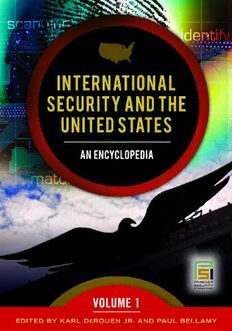
International Security and the United States: An Encyclopedia PDF
1003 Pages·2007·7.553 MB·English
Most books are stored in the elastic cloud where traffic is expensive. For this reason, we have a limit on daily download.
Preview International Security and the United States: An Encyclopedia
Description:
Shaped by often very dramatic events, international security and the international system have changed significantly in recent years. The conclusion of the Cold War, the emergence of new political systems, the growth of significant threats such as terrorism, and the development of new security doctrines have driven global transformation. These volumes provide detailed information on countries from every geographic region and continent on the globe, evaluating their relationship with the United States and measuring the potential security threats posed by each. The contributors consider factors such as geography and history; the political systems of each state; their human rights records; the ability to maintain law and order and provide security within their own borders; the impact of current administrations, rulers, or regimes on a nation's foreign policy; and the regional factors that often dictate local politics, in order to make their assessments.All of the entries in this set follow a standardized outline and present a concise, but detailed assessment of each country. Each entry begins with a discussion of geography through which the contributors identify the state's natural resources, environmental issues, and the extent of its territorial jurisdiction. The focus then shifts to social and political organizations. Populations are broken down by not only numbers, but by ethnic and religious affilitations, access to health care, education, housing, and income. All of those aspects are often a reflection of the system of government in place. Like the United States, those governments are comprised of different parties or leaders with various interests. The contributors assess those entities and interests within each country. They measure the ways in which factors of religion, nationalism, and globalism impact and shape not only domestic policies but also foreign policy, and, ultimately, the country's relationship to the United States. Other areas, such as military organizations and activities, records on human rights and justice (recognition of and adherence to international conventions), and national attitudes towards security are also considered. Every entry also includes an assessment of current and potential security issues and an analysis of current terrorist threats that may already be in place or that are beginning to develop in various nations. Each entry concludes with a summary of current relationships with the United States. Those relationships are defined by the indentification and brief analysis of formal trade, aid, or military treaties in place between the United States and other nations, the general attitude of a nation's citizenry and its government towards the U.S., and, finally, indentifying any social and cultural links between nations and the U.S. (migration patterns, language, economies). Finally, possible changes and trends that will impact security issues are identified by the contributors. Taken in their entirety, these encyclopedias contain a wealth of information in a concise format that will serve as a valuable reference guide not only for specialists, but general readers as well.
See more
The list of books you might like
Most books are stored in the elastic cloud where traffic is expensive. For this reason, we have a limit on daily download.
